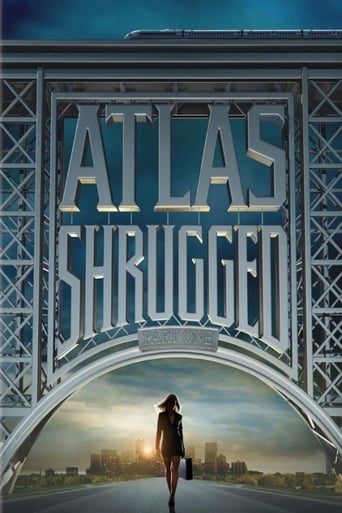LouHomey
From my favorite movies..
Billie Morin
This movie feels like it was made purely to piss off people who want good shows
Edison Witt
The first must-see film of the year.
Lela
The tone of this movie is interesting -- the stakes are both dramatic and high, but it's balanced with a lot of fun, tongue and cheek dialogue.
Eric Stevenson
When I was looking at movie series on RottenTomatoes, I was looking to see what was the lowest rated one of them all that had at least three entries with reviews there. It's none other than this series. I have heard a lot about the book and have no desire to read it. This tells the story of a company that makes metal for railroads. Its employees start quitting and vanishing with no explanation other than people keep asking who John Galt is. That's really all this movie is. It is dreadfully boring. I think the only reason I didn't fall asleep is because the movie was a lot shorter than I thought.Having seen the second one first, I suppose this is slightly better, but it's still crap. This movie is just businessmen talking and talking. Mike Nelson couldn't possibly have seen these films because they are more boring than anything in "The Phantom Menace". At least that one had lightsabers in it! All we have in this movie is talk, talk, talk, and no action at all. I don't remember any of these characters' names. The acting is so bad that all of these characters are dull and uninteresting. If I wanted to watch something like this, I'd watch the news.I'm confused as to why this or the other films haven't been on Rifftrax or Channel Awesome and I think I know why. There's practically nothing to even mock here! Every scene is so monotonous it's hard to tell one from another. There's a big fire but even that's boring. I guess the best thing is probably how short it is. I remember Penn and Teller criticizing the Bible, but then they admitted they read books most people consider dumb like this film. As a long book, if this is supposed to be the Bible for atheists, I'll gladly believe in God. *1/2
lois-lane33
This is a very good film but the whole thing falls apart spectacularly in the second installment because they used all different actors to carry the same story along-a story that loses its edge and becomes commonplace in the second film. That being said this film captures the essence of Anne Rands work-a writer who was ahead of her time and a person who had a unique vision of the future. Her style was apparent in the first film but the change of personnel didn't maintain the same feeling that existed in the first film with regards it being a definitive representation of Anne Rand's work. Some people won't mind the funny way they executed this multi film project- its still something to watch when its cold outside type of thing-but others, like myself think they could have done better and should have tried more to do the project more professionally. I can remember this being advertised but I cannot remember it ever being on any screens anywhere around after it was released. Usually I don't miss the more interesting films. The thing that is a resounding issue in the work of Anne Rand is she is basically a 'new romantic' writer even though she described herself as an "objectivist" and considered her work as a way to promote 'a new philosophy of Objectivism.' She was a different type of writer.
n-sotirakopoulos
The film is really praise-worthy, as, despite its low budget, it manages to capture the spirit of the book. In addition, the leading actors really personify well Rand's characters from the book. The plot (as opposed to the second film) does not miss much from the book, although I'd add another 20-30 minutes to include some more extended dialogues/monologues from the book (especially from Rearden's anniversary party). The film gives a spoiler by showing that it's John Galt who is taking away the people who are missing, although I can understand it from scope of the economy of the film series. Overall, as someone who enjoyed the book and was preparing for a B-movie, I was really positively surprised from the film, connected with the heroes and attached their faces to the book's character (I watched Part 1 without having finished the book). This is why I was so much disappointed from Part 2 and the change in the cast. In any case, the book is so exciting, that no film adaptation can be good enough...however, Part 1 makes a decent effort.
artisticengineer
Though not an objectivist, I have an interest in the philosophy or belief system. Since seeing the 1940s movie "The Fountainhead" some years ago I have been waiting for the movie adaptation of "Atlas Shrugged". Well, my wait was rewarded with the issuance of Part I, but I noticed that this movie did not receive much publicity. Well, Hollywood is full of dreamers and socialists who cannot or will not face reality so I figured that was the reason. It wasn't. This movie goes to such lengths to show the Objectivist philosophy that it, ironically, actually breaks completely with reality. This should never have been filmed.The movie starts by showing the conditions of the American economy of 2016 and the problems faced in this economy. It is a somewhat unrealistic in how grim the economy of 2016 is portrayed but that does not go beyond the bounds of belief. The situation develops into a crisis where a railroad firm that needs to replace some very old track in Colorado. The movie implies that this old track is a century old. I doubt that any rails that old are left in place in real life but that is not the primary problem with this movie. What is the primary problem is that we have a railroad executive and deciding to use a new metal that is advertised as lighter and stronger than the metal used up to that time for rails. This metal is untested and unproved yet the executive goes with her (yes, the executive is a woman and strong willed women are found in Ayn Ryn's works; as can be expected due to the author) hunch. If she is right there is a tremendous improvement in the rail business; if she is wrong the railroad will go out of business. The manufacturer of this metal has a full factory dedicated to its production.This whole situation is insane!! We are asked to suspend disbelief and assume that somebody is using an untried metal in an endeavor with public safety concerns?! That would not even be allowed due to issues of it affecting the good of the people. By even using the objectivist criteria this concept is still insane. A company would go out of business if this metal fails, so would it not be in the self-interest of the owner of the railroad to have it tested before he/she commits to it? Of course it would! Metal or metallurgical testing is a very developed science. To use an untested metal (this is the first commercial use of the metal no less) on a major project that involves public safety is not the decision of a self-interested person with vision but rather that of a deluded individual who probably has visions due to hallucinations! I know of the qualification requirements for use of new materials and everybody (objectivist or socialist) agrees the process should be very thorough. This movie is so far off that there is no way it could be viewed as realistic. There is a limit to suspension of disbelief and this movie goes beyond that limit. Objectivism or socialism or any other philosophy is not proved or disproven by this movie as it is just too unrealistic. Sad.

